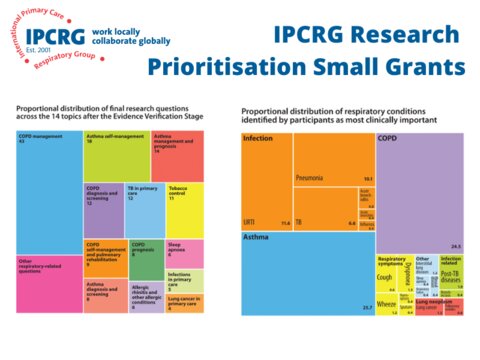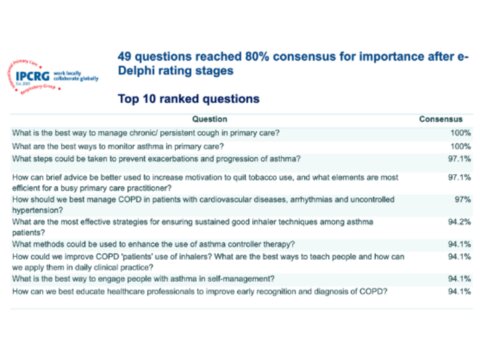IPCRG Research Prioritisation Small Grants - Awardees announced

IPCRG is delighted to be able to further support research into respiraotry primary care through the IPCRG Research Prioritisation Small Grants programme. This programme supports the response to our 2021 research prioritisation exercise.
Our research priorities are bring taken forward by 11 new projects, which run into 2024.
The 5 projects awarded a grant from our first round are:
- How can I exercise at home? Using photo-elicitation to understand sustainable pulmonary rehabilitation methods among people living with COPD in Malaysia (Hani Syahida Salim, Malaysia)
- Barriers and facilitators to implementation and uptake of inhaled medicines for the treatment of asthma in The Gambia (Shamanthi Jayasooriya, UK)
- Priorities and barriers in asthma care in primary health care in selected Central and (South)eastern European countries (Žan Trontelj, Slovenia)
- A systematic review about the possible role of learning theories in the development of a new educational model for inhalation technique in asthma or COPD patients (Lars Dijk, Nederland)
- Exploring the multidisciplinary approach in the management of persistent cough within primary care in resource limited settings (Edwinah Atusingwize, Uganda)
The six projects awarded a grant from the second and final round are:
- Applying the Test of Adherence to Inhalers Toolkit to patients with COPD in Kyrgyzstan (Aizhamal Tabyshova, Kyrgyzstan)
- Exploring the association between sleep apnoea and chronic cough in the Kyrgyz Republic: towards the definition of an ad-hoc diagnostic pathway for primary care (Lorenzo Cirri, Switzerland/Kyrgyzstan)
- Identifying monitoring tools from the GPs and patient perspective for uncontrolled symptoms of asthma, chronic cough or breathlessness (Alice Crawford, Australia)
- Reviewing the current role of remote care strategies in the management of childhood asthma (Mauricio Soto, Chile)
- Development and feasibility evaluation of a decision support tool to diagnose and manage chronic cough at primary health clinics (Wen Ming Koh, Malaysia)
- Exploring stakeholders’ attitudes and perspectives on screening for COPD (Zihan Pan, China)
We also intend the programme to help Early Career Researchers to develop their expertise. Proposals from any country were invited, from recognised research organisations (e.g University or Research Institute).
We are excited about this unique opportunity, the results it should offer to respiratory primary care, and the interest we expect it to stimulate in respiratory primary care research. We very much look forward to seeing the finished projects.
Our key criteria were:
- The likelihood that the question concerned will be (in part or in full) answered
- The impact and potential to make a difference to care
- The impact, in terms of primary care and respiratory research capacity
- Clear research approach and justification
- The support of an experienced supervisor
- Appropriate data source, study design and analysis methods
- Awareness and compliance with regulations and issues around accessing data
- The quality of the proposal
- Have the potential to be used as models for larger projects

We thank you for your submissions.
IPCRG Research Leadership Team